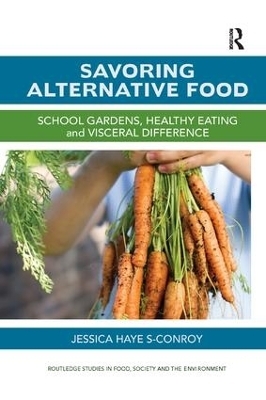
Savoring Alternative Food
School gardens, healthy eating and visceral difference
Seiten
2017
Routledge (Verlag)
978-0-8153-9533-1 (ISBN)
Routledge (Verlag)
978-0-8153-9533-1 (ISBN)
In this challenging book, the author explores the contradictions and shortcomings of alternative food activism to demonstrate the importance of moving beyond a promotion of universal "shoulds" of eating, and towards a practice of food activism that is more sensitive to issues of social and material difference.
Advocates of the alternative food movement often insist that food is our "common ground" – that through the very basic human need to eat, we all become entwined in a network of mutual solidarity. In this challenging book, the author explores the contradictions and shortcomings of alternative food activism by examining specific endeavours of the movement through various lenses of social difference – including class, race, gender, and age.
While the solidarity adage has inspired many, it is shown that this has also had the unfortunate effect of promoting sameness over difference, eschewing inequities in an effort to focus on being "together at the table". The author explores questions of who belongs at the table of alternative food, and who gets to decide what is eaten there; and what is at stake when alternative food practices become the model for what is right to eat? Case studies are presented based on fieldwork in two distinct loci of alternative food organizing: school gardens and slow food movements in Berkeley, California and rural Nova Scotia. The stories take social difference as a starting point, but they also focus specifically on the complexities of sensory experience – how material bodies take up social difference, both confirming and disrupting it, in the visceral processes of eating.
Overall the book demonstrates the importance of moving beyond a promotion of universal "shoulds" of eating, and towards a practice of food activism that is more sensitive to issues of social and material difference.
Advocates of the alternative food movement often insist that food is our "common ground" – that through the very basic human need to eat, we all become entwined in a network of mutual solidarity. In this challenging book, the author explores the contradictions and shortcomings of alternative food activism by examining specific endeavours of the movement through various lenses of social difference – including class, race, gender, and age.
While the solidarity adage has inspired many, it is shown that this has also had the unfortunate effect of promoting sameness over difference, eschewing inequities in an effort to focus on being "together at the table". The author explores questions of who belongs at the table of alternative food, and who gets to decide what is eaten there; and what is at stake when alternative food practices become the model for what is right to eat? Case studies are presented based on fieldwork in two distinct loci of alternative food organizing: school gardens and slow food movements in Berkeley, California and rural Nova Scotia. The stories take social difference as a starting point, but they also focus specifically on the complexities of sensory experience – how material bodies take up social difference, both confirming and disrupting it, in the visceral processes of eating.
Overall the book demonstrates the importance of moving beyond a promotion of universal "shoulds" of eating, and towards a practice of food activism that is more sensitive to issues of social and material difference.
Jessica Hayes-Conroy is Assistant Professor of Women’s Studies, Hobart & William Smith Colleges, Geneva, New York, USA.
Introduction – Eating Sea Urchin for Breakfast Part 1: Table Settings 1. Exploring Visceral (Re)Actions 2. Doing Visceral Research 3. Knowing Food Part 2: Tasting Difference 4. A Tale of Two Dinners 5. It’s Not Just About the Collard Greens 6. Real Men Eat Raw Onions 7. We Run it All Off! Part 3: Policy and Practice 8. Food Pedagogies Conclusion – A Thousand Tiny Eithers; A Thousand Tiny Ors References
| Erscheinungsdatum | 18.12.2017 |
|---|---|
| Reihe/Serie | Routledge Studies in Food, Society and the Environment |
| Zusatzinfo | 2 Tables, black and white |
| Verlagsort | New York |
| Sprache | englisch |
| Maße | 156 x 234 mm |
| Gewicht | 453 g |
| Themenwelt | Geschichte ► Teilgebiete der Geschichte ► Kulturgeschichte |
| Sozialwissenschaften ► Soziologie ► Gender Studies | |
| Technik ► Umwelttechnik / Biotechnologie | |
| Weitere Fachgebiete ► Land- / Forstwirtschaft / Fischerei | |
| ISBN-10 | 0-8153-9533-7 / 0815395337 |
| ISBN-13 | 978-0-8153-9533-1 / 9780815395331 |
| Zustand | Neuware |
| Haben Sie eine Frage zum Produkt? |
Mehr entdecken
aus dem Bereich
aus dem Bereich
der stille Abschied vom bäuerlichen Leben in Deutschland
Buch | Hardcover (2023)
C.H.Beck (Verlag)
CHF 32,15
vom Mittelalter bis zur Gegenwart
Buch | Softcover (2024)
C.H.Beck (Verlag)
CHF 16,80


